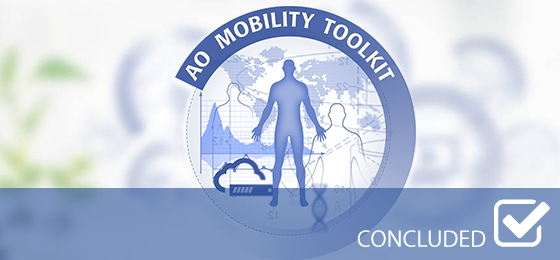AO Mobility Toolkit
The AO Mobility Toolkit—the first electronic patient mobility monitoring system being utilized in large multicenter research trials—will continue to evolve, even as the Strategy Fund-supported portion of its development concludes.
Originally conceived as a “mobility toolkit” allowing physicians and researchers to collect and use objective outcome data on patient performance-based measures (PBMs), the AO Mobility Toolkit project got underway in 2015 and today is an ever-evolving and ever-expanding software suite. It encompasses three motion sensor applications and two website functions for use by rehabilitation physicians, physical therapists, orthopedic surgeons, neurologists, geriatricians and prosthetists, and could be very useful to total joint replacement surgeons tracking patient mobility before and after surgery.
“There are many electronic systems available to monitor patient’s mobility, but the AO Mobility Toolkit is the first one being utilized in large, multicenter research trials, and it could potentially become the standard for use in multicenter clinical research,” said Project Leader Dr Stephen Sims, past chair of AO Trauma North America, AO Foundation Trustees Alumnus, past AO Trauma International Board member, and editor for the AO Trauma Pelvis and Acetabulum Education Taskforce. Sims’ collaborators on the project were recently retired Dr Richard Peindl, Chair of Bioengineering for Atrium Health (formerly Carolinas Medical Center); AO Foundation Past President Dr James Kellam; and Dr Rachel Seymour, Director of Research of the Musculoskeletal institute at Atrium Health.
The project has its roots in Peindl’s interest in assessing fall risks of head injury patients and elderly patients. A funding shortfall had stalled development of a mobility cloud for storing information related to that work, and that’s where Sims, the AO Mobility Toolkit project team—and the Strategy Fund—stepped in.
Today, the AO Mobility Toolkit is being used in two research centers and soon will be used at an additional seven sites, Sims said, including centers that are part of the US Department of Defense-funded Major Extremity Trauma Research Consortium (METRC). Additionally, it's listed in other research projects that could expand it to another five or 10 sites.
“So, it could be in use at 12 to 15 sites in the next few months,” he explained. “We are pleasantly surprised at how it has grown to include software and hardware to make it very useable for clinical research.”
“This project would not have taken place without support from the AO. There has also been significant financial support from Atrium Health, as well as Atrium Health Clinical Research,” Sims said. “The AO Mobility Toolkit project has shown that you can—in a very simple, non-intrusive way—get a much more refined objective measurement of patient PBMs and that this can be a very valuable research tool.”
Contact
Please contact the team at strategyfund@aofoundation.org


